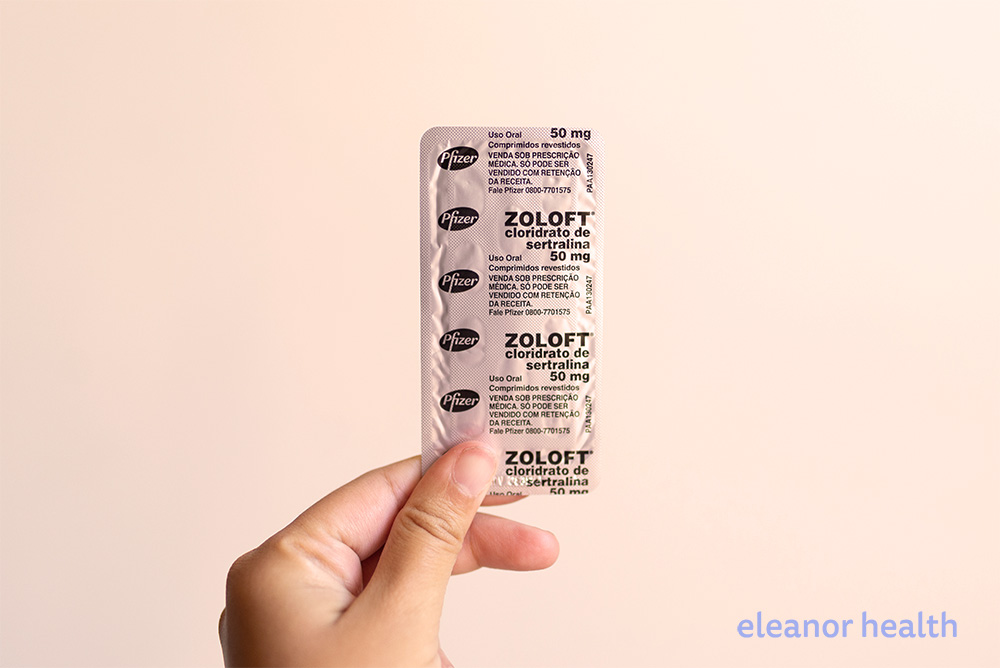Zoloft is a brand name for the medication sertraline, which is used to treat a variety of mental health conditions, including major depressive disorder, post-traumatic stress disorder (PTSD), social anxiety disorder (SAD), panic disorder, premenstrual dysphoric disorder (PMDD), and obsessive-compulsive disorder (OCD). The drug is one of seven selective serotonin reuptake inhibitor (SSRI) drugs on the market in the United States.
This antidepressant drug works by increasing levels of the neurotransmitter serotonin in the brain, helping to reduce anxiety and depression and alleviate symptoms of OCD. It’s important to note that Zoloft and other antidepressants can have serious side effects, and should be used under the guidance of a healthcare provider.
Similarly to other SSRIs, Zoloft increases serotonin levels in the brain. Serotonin is a chemical messenger that plays an essential role in regulating mood and anxiety. When serotonin levels are normal, it can help regulate your mood, and improve feelings of happiness and contentment. However, serotonin levels fluctuate from person to person, and some people produce lower levels of serotonin. When serotonin levels are low, it can affect our mood, leading to symptoms such as depression, anxiety, irritability, and difficulty in regulating emotions.
Zoloft blocks the reuptake of serotonin, which means it prevents the serotonin from being taken back into the nerve cells that released it. This results in more serotonin being available in the brain, which can help to improve mood and reduce symptoms of depression, anxiety, and other mental health conditions. The full effects of this antidepressant drug may take several weeks to be seen.
You may consider speaking with your doctor about Zoloft if you are experiencing symptoms of anxiety or depression.
It can take several weeks for the full effects of Zoloft to be seen, but the exact time frame will vary depending on the individual and their condition. Some people may start to feel better within the first 1–2 weeks of treatment, while others may not experience improvement until after several weeks of treatment. The brain takes time to adjust to the presence of increased serotonin levels. It’s important to be patient and give the medication enough time to work.
When taking Zoloft, it is recommended to start with a low dose and gradually increase it to the recommended dosage. The initial dose is usually 25 mg per day and then increased to 50 mg per day after one week. The usual recommended dose is 50 mg to 100 mg per day. Your doctor will monitor your progress and adjust the dosage if necessary.
Like all medications, Zoloft (sertraline) can cause side effects in some people. The most common side effects of Zoloft include:
Common side effects, such as nausea, headache, and drowsiness, may occur within the first few days of treatment and usually go away within a few days or weeks.
Sexual dysfunction side effects, such as decreased libido or difficulty achieving orgasm, may occur early on in treatment or may develop later, after several weeks or months of treatment.
There are also some less common but more serious side effects associated with Zoloft, such as:
Less common but more serious side effects may occur at any time during treatment, but it is important to be aware of them and to immediately contact a healthcare professional if they occur.
The side effects of Zoloft (sertraline) may be similar in both men and women, but some studies have suggested that there may be some differences in how men and women experience side effects.
One of the most common side effects of Zoloft is sexual dysfunction, which can include decreased libido, difficulty achieving or maintaining an erection, and difficulty achieving orgasm. Studies have suggested that this side effect may be more common in men than in women.
Research also suggests that women may be more likely to experience some side effects during PMS (premenstrual syndrome) such as headaches and breast tenderness.
If you experience side effects that are severe or persistent, or if you experience any side effects that are not listed here, it is important to contact your healthcare provider right away.
Withdrawal symptoms commonly occur when a person abruptly stops taking Zoloft. The brain may have to adjust to the sudden decrease of serotonin, causing a range of withdrawal symptoms, also called discontinuation syndrome.
The withdrawal symptoms can vary depending on the individual, but they may include:
It’s important to note that not everyone will experience withdrawal symptoms when stopping Zoloft, but for those who do, symptoms usually start within a day or two after stopping the medication and usually last for a few days to a couple of weeks.
To minimize withdrawal symptoms, it’s recommended to gradually taper off the medication under the guidance of a healthcare professional. Tapering off the medication slowly allows the brain to adjust to the decrease in serotonin levels and can help minimize withdrawal symptoms.
If you are affected by addiction or concerned about your mental health, it’s important to know that there are organizations that can help you. At Eleanor Health, we’re committed to providing personalized treatment plans to help you get the future you want, without judgment. We’re located in Louisiana, Massachusetts, North Carolina, New Jersey, Ohio, Texas, and Washington. Connect with us today to learn more about how we can help.
 Can You Drink on Zoloft (Sertraline)?
Can You Drink on Zoloft (Sertraline)?
 Alcohol and Depression: A Cycle
Alcohol and Depression: A Cycle
 Therapy for Anxiety, Depression, Trauma: 3 Common Types
Therapy for Anxiety, Depression, Trauma: 3 Common Types